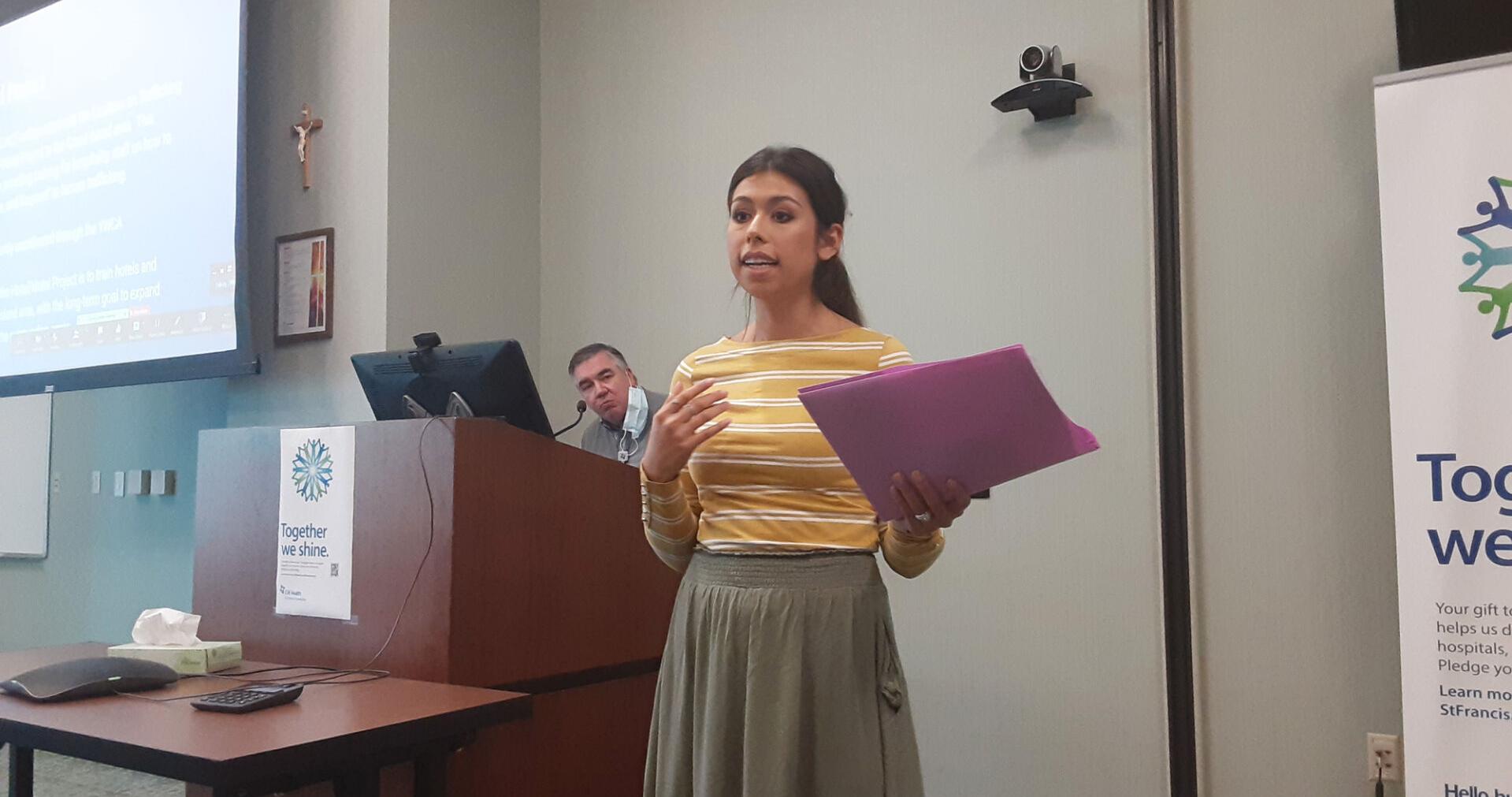Hotel/Motel Project combats Grand Island sex, labor trafficking

Human trafficking is happening in Grand Island.
To combat sex and labor trafficking, the Hotel/Motel Project is relaunching via Grand Island YWCA.
The free, 45-minute training is given to local hotels and motels to help their staff to “realize, recognize and respond to human trafficking,” explained Empowerment Programs Coordinator Marissa Cornelius.
“We gather some volunteers throughout the community who then get trained on giving this presentation, and then they go out to the hotels and motels and train all of the staff,” she said. “Managers, housekeeping, front desk people, anyone involved. If the owner wants to participate, that would be great as well.”
The informative powerpoint presentation has an interactive component and directly engages the hotel/motel staff, said Cornelius.
It covers: What is human trafficking? Is it here in Grand Island? And, what to do if you see it and how to respond and report it.
If it is an emergency, such as a violent incident occurring, always call 911 immediately.
Incidences can be reported to the Nebraska Human Trafficking Hotline at their new hotline phone number: 833-757-5665 (833-PLS-LOOK).
The training is also provided through Grand Island Area Coalition on Human Trafficking.
It was brought to the attention of YWCA after a report in 2016 labeled Grand Island a hotspot for human trafficking, said Cornelius.
“YWCA took this on in 2019 and got four hotels trained, but then the (COVID-19) pandemic came, and we're still trying to gather everything and let it be a little more successful,” she said. “We're going to hopefully launch again in the new year.”
Four hotels received the training prior to the pandemic, said YWCA Executive Director Amy Bennett.
“We weren't really able to relaunch as the pandemic kept going long past what we thought was going to happen,” she said.
In March, YWCA began retraining.
“We had to go back to our volunteers and say, ‘We need to do a refresher because it's been two years since we've done this',” said Bennett.
Two more hotels have received training in the meantime.
Human trafficking is more than sex trafficking, it also includes labor trafficking, emphasized Bennett.
The 2016 statistics used by YWCA are from a Creighton University study, which showed Grand Island was one of largest hotspots in Nebraska for trafficking.
More current data is difficult to find, as the data in the study came from Backpage.com, which has been shut down by the U.S. government.
The data YWCA does have are from people self-reporting (it happened to them) or they're getting caught, said Bennett.
“We do know that cases are happening in Grand Island and in surrounding areas,” she said. “We have examples in our trainings of where it's happened. One example is, one of our rural communities had a mother who was trafficking her daughters.”
Understanding human trafficking can also help undo some of the fears and paranoia some people have, said Bennett.
“People still think that sex trafficking is happening because some guy is following you in the Walmart parking lot and is going to try to grab you. We know that's not the case,” she said. “People are being groomed. Kids are being groomed through online games and relationships with people they trust.”
She added, “It's generally not something that's happening because some person at Walmart grabbed you and threw you in a van and drove away.”
The training is worthwhile, said Cornelius.
“When I speak with hotels and motels, they all say they get some sort of human trafficking training. However, all of them receive online training,” she said. “When you do things online, it's not as interactive. It's not as personal when it's through a computer, as opposed to having someone there, putting a face to a name, someone they can reach out to with questions.”
YWCA follows up every six months and continues to offer training for new staff, Cornelius added.
“It's really helpful to have that one person who comes in and talks with the staff,” she said.
It is also a local training, said Bennett, with examples of trafficking that are locally relevant, including statistics, and access to local resources.
“There are surveys done after each training, and all of the surveys that have come back from the staff who have taken it have told us that they feel better equipped now to address the issue of trafficking if they see it,” she said.
To become a Hotel/Motel Project volunteer to give the presentation or for hotels and motels interested in receiving the training, contact Marissa Cornelius at 308-384-9922 or email [email protected].
For more information, visit www.heartlandunitedway.org/grand-island-area-coalition-trafficking or email [email protected].
Those interested can also visit facebook.com/GrandIslandACT.
This “Eyes on Trafficking” story is reprinted from its original online location.
 ABOUT PBJ LEARNING
ABOUT PBJ LEARNING
PBJ Learning is a leading provider of online human trafficking training, focusing on awareness and prevention education. Their interactive Human Trafficking Essentials online course is used worldwide to educate professionals and individuals how to recognize human trafficking and how to respond to potential victims. Learn on any web browser (even your mobile phone) at any time.
More stories like this can be found in your PBJ Learning Knowledge Vault.
EYES ON TRAFFICKING
This “Eyes on Trafficking” story is reprinted from its original online location.
ABOUT PBJ LEARNING
PBJ Learning is a leading provider of online human trafficking training, focusing on awareness and prevention education. Their interactive Human Trafficking Essentials online course is used worldwide to educate professionals and individuals how to recognize human trafficking and how to respond to potential victims. Learn on any web browser (even your mobile phone) at any time.
More stories like this can be found in your PBJ Learning Knowledge Vault.
